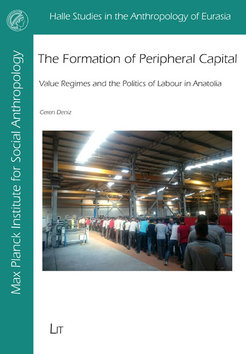The Formation of Peripheral Capital
Value Regimes and the Politics of Labour in Anatolia

This book is a critical engagement with mainstream accounts of thriving regional economies in Turkey commonly encapsulated in the term ‘Anatolian Tigers’.
Based on twelve months ethnographic fieldwork in Çorum, a city in Central Anatolia that has not attracted much scholarly attention hitherto, Deniz explores the formation, expansion and sustaining of medium-size businesses through political economy and moral economy perspectives. The concept of ‘value regimes’ runs through the chapters, highlighting the relational mechanisms that turn labour into value in local and global processes of capital accumulation and what local people themselves find worthy. The findings demonstrate the formation of the entrepreneurial stratum as a multifaceted process of economic reconfiguration. They portray how people respond to market- driven changes, experienced sometimes as restrictions but sometimes as opportunities. Entrepreneurs, their workers and their family members are all active agents in shaping their livelihoods in ways that are meaningful to them. Deniz illuminates individual and collective values, sentiments, and the aspirations of non-Islamist actors as well as political Islam. She analyses the role of the state and longue durée socio-economic historical changes in explaining business trajectories, which cannot be reduced to the strategies of individuals or to the adoption of ‘successful economic models’ in the post-1980s era.
In her description of production and social relations at the workplace, Deniz demonstrates the entanglements of market and non-market dynamics, addressing how ‘value regimes’ create and sustain the core inequalities that are intrinsic to capitalism. Her materials illustrate the importance of kinship, religion and social values in shaping recruitment, working conditions, the organization of work, and negotiations of time, remuneration and incentives. Kinship relations and the practice of Sunni Islam at the workplace are not stable and they too are subject to negotiation. The focus on the everyday politics of labour reveals that central Anatolian workplaces are characterized by complex mutual obligations and expectations, paternalism, domination and autonomy.
This ethnographic study constitutes an original contribution to the field of economic anthropology and anthropology of work and labour. It will also be of interest to wider audiences in sociology, political science, labour economics and Turkish studies.
